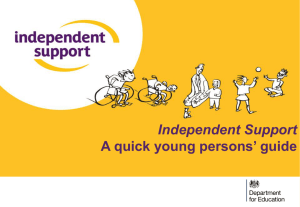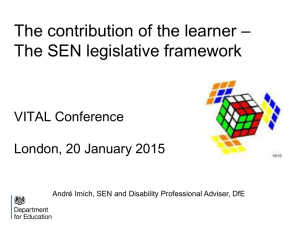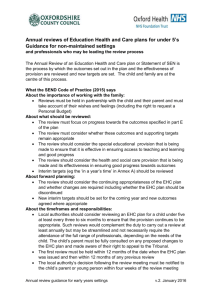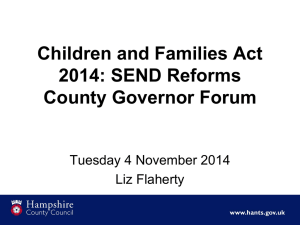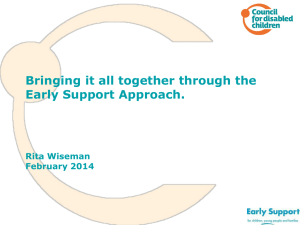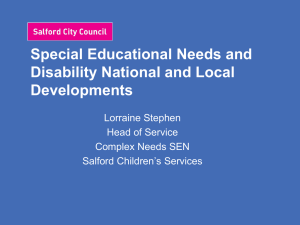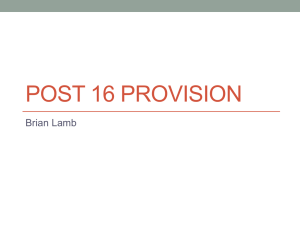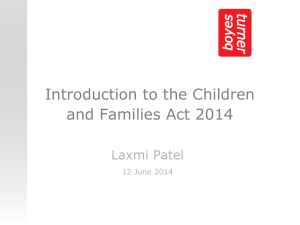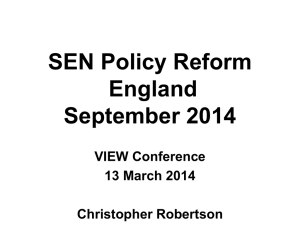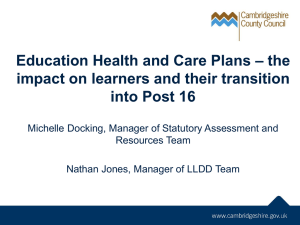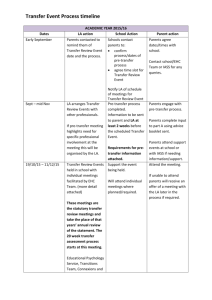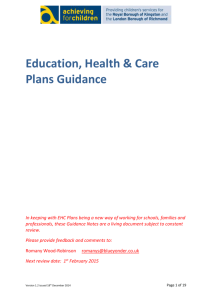4. EHC Transition Plan Version 6 - 040314
advertisement
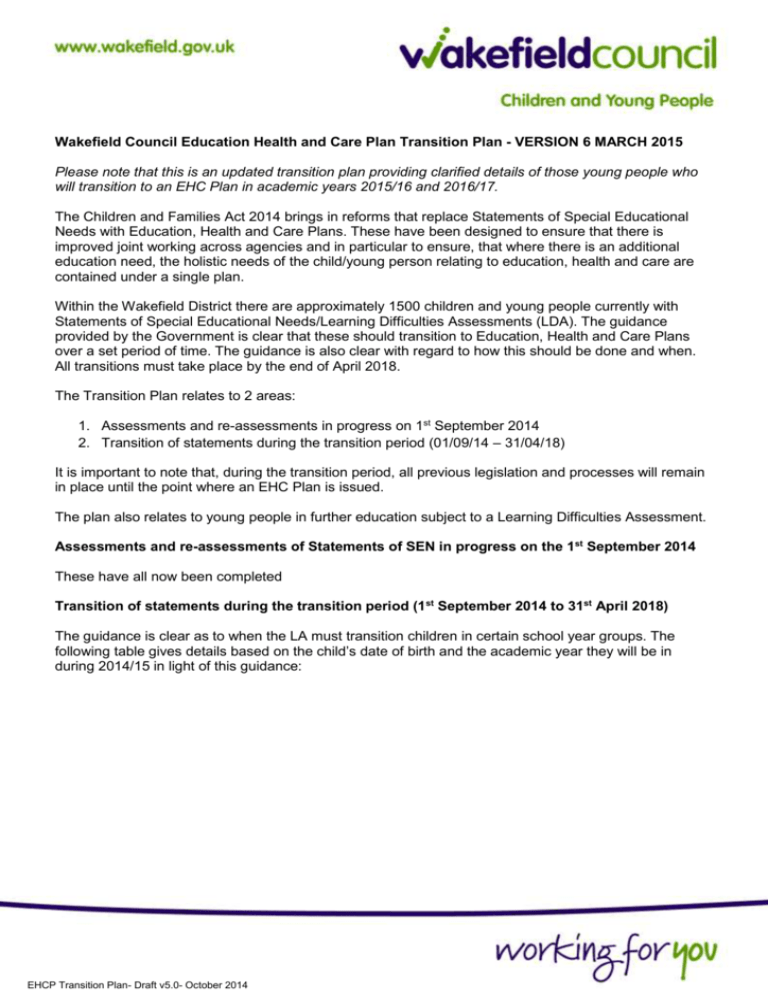
Wakefield Council Education Health and Care Plan Transition Plan - VERSION 6 MARCH 2015 Please note that this is an updated transition plan providing clarified details of those young people who will transition to an EHC Plan in academic years 2015/16 and 2016/17. The Children and Families Act 2014 brings in reforms that replace Statements of Special Educational Needs with Education, Health and Care Plans. These have been designed to ensure that there is improved joint working across agencies and in particular to ensure, that where there is an additional education need, the holistic needs of the child/young person relating to education, health and care are contained under a single plan. Within the Wakefield District there are approximately 1500 children and young people currently with Statements of Special Educational Needs/Learning Difficulties Assessments (LDA). The guidance provided by the Government is clear that these should transition to Education, Health and Care Plans over a set period of time. The guidance is also clear with regard to how this should be done and when. All transitions must take place by the end of April 2018. The Transition Plan relates to 2 areas: 1. Assessments and re-assessments in progress on 1st September 2014 2. Transition of statements during the transition period (01/09/14 – 31/04/18) It is important to note that, during the transition period, all previous legislation and processes will remain in place until the point where an EHC Plan is issued. The plan also relates to young people in further education subject to a Learning Difficulties Assessment. Assessments and re-assessments of Statements of SEN in progress on the 1st September 2014 These have all now been completed Transition of statements during the transition period (1st September 2014 to 31st April 2018) The guidance is clear as to when the LA must transition children in certain school year groups. The following table gives details based on the child’s date of birth and the academic year they will be in during 2014/15 in light of this guidance: EHCP Transition Plan- Draft v5.0- October 2014 Year Group (14/15) Date of Birth Pre-5 Lower Foundation Stage Upper Foundation Stage 1 Post 1/9/11 Academic year of transition During academic year when transitioning from Early Years setting to school ie Upper Foundation/Reception 1/9/10 - 31/8/11 2014/15 1/9/09 - 31/8/10 1/9/08 - 31/8/09 2016/17 2015/16 If in an infant school; 2014/15. If in a primary school; if annual review falls prior to Christmas holidays, 2016/17. If annual review falls after Christmas holidays 2014/15 2015/16 If annual review falls prior to Feb half term, 2016/17. If annual review falls after Feb half term 2015/16 If annual review falls prior to Feb half term, 2015/16. If annual review falls after Feb half term 2014/15 If parents specifically request it; transition will take place in 2014/15. If parents do not make requests transition will occur in 2016/17 2016/17 2015/16 42 81 2 3 1/9/07 - 31/8/08 1/9/06 - 31/8/07 4 1/9/05 - 31/8/06 5 1/9/04 - 31/8/05 6 7 8 1/9/03 - 31/8/04 1/9/02 - 31/8/03 1/9/01 - 31/8/02 9 10 11 1/9/00 - 31/8/01 1/9/99 - 31/8/00 1/9/98 - 31/8/99 16+ Transition between mainstream and special or vice versa Number 8 Pre 1/9/98 New to district Those in youth custody EHCP Transition Plan- Draft v6 - March 2014 2016/17 2015/16 2014/15 High Needs Learners in receipt of element 3 funding in their first year of provision will transition in 2014/15. High Needs Learners in receipt of element 3 funding in their second or more year of funding will transition in 2015/16. Those with a statement or LDA not in receipt of element 3 funding will transition in 2015/16 if required. In the academic year of the proposed change of school, if this has not already happened When becoming resident in Wakefield from another LA When released from custody, if this has not already happened 67 75 94 99 99 107 115 114 118 142 143 1st year HNL- 112 2nd year HNL- 158 Delegatedunknown For clarity, the following table provides details of all those young people who will transition in academic year 2015/16: Year Date of Birth Key points Number Group (15/16) Lower 1/9/11 – 31/8/12 Full year group 8 foundation 2 1/9/08 - 31/8/09 Full year group 67 4 1/9/06 - 31/8/07 Full year group 94 5 1/9/05 - 31/8/06 If annual review falls after Feb half term 56 6 1/9/04 - 31/8/05 If annual review falls prior to Feb half term or if 56 transition was not completed in academic year 2014/15 9 1/9/01 - 31/8/02 Full year group 114 11 1/9/99 - 31/8/00 Full year group 142 Y12+ Pre 1/9/98 High Needs Learners in receipt of element 3 funding 158 in their second or more year of provision where they will still be in education after the end of the academic year and there is a request to transition. High Needs Learners not in receipt of element 3 funding where they will still be in education after the end of the academic year and there is a request to transition. All year Those moving from mainstream to special groups school or vice versa Those moving into district Those leaving youth custody Unless already completed in line with the transition plan And the following table provides details of all those young people who will transition in academic year 2016/17: Year Date of Birth Key points Number Group (16/17) Lower 1/9/12 – 31/8/13 Full year group Foundation 2 1/9/09 - 31/8/10 Full year group 81 4 1/9/07 - 31/8/08 Those in primary (not infant) school whose annual 18 review is due in the Autumn term 6 1/9/05 - 31/8/06 If annual review falls prior to Feb half term or if 41 transition was not completed in academic year 2015/16 8 1/9/03 - 31/8/04 Full year group 104 9 1/9/02 - 31/8/03 Full year group 113 11 1/9/00 - 31/8/01 Full year group 112 Y12+ Pre 1/9/98 Any still in education provision who are high needs learners with a statement who have not yet transitioned and will continue to be in education after the end of the academic year All year Those moving from mainstream to special groups school or vice versa Those moving into district EHCP Transition Plan- Draft v6 - March 2014 Those leaving youth custody Unless already completed in line with the transition plan Transition year 2014/15 2015/16 2016/17 Number of transitions 547/28% (max 517/34%) 695/42% (max 700/46%) 469/30% (max 485/32%) During the transition year, a Transfer Review will replace the Annual Review of the statement. These will broadly take place within the same timescales as previous annual reviews. The exceptions to these are those at points of transfer as follows: Year 6 and for those attending Infant Schools Year 2. The meeting for these must be completed by October half term Year 11. The meeting for these must be completed by the end of the Autumn term The Local Authority is responsible for co-ordinating the Transfer Review with the School/Education provider, however the School/Education provider is expected to chair the Transfer Review meeting. An Officer from the Special Educational Needs Assessment and Review Team (SENART) will notify the school/college and parent/young person at least 2 weeks before the review is due. The LA will work with each school/college to support them in planning all the Annual reviews for the year to ensure that the Transition Reviews are known about and planned for in advance. This will include providing lists of named children/young people to transition. The LA will also work with services such as EPS to ensure clear planning for reviews so that information is accurate and up to date. A review cannot take place if a formal appeal is in place. Prior to the review the school/college should work with the parents/carers and the child/young person to make sure the relevant information in the ‘My Support Plan’ is completed. This could be done individually or with support from a designated Key worker. The school should also ensure that the parts of the My Support Plan relevant to school outcomes are also completed and that the plan is shared with other agencies supporting the child. This should be shared a minimum of two weeks prior to the Transfer review meeting. The completed My Support Plan forms the basis of the EHC needs assessment and the EHC Plan, in combination with the prior Statement of Special Educational Needs. If advice and information for the ‘My Support Plan’ has previously been provided and all are satisfied that it is sufficient, further information will not be necessary. Local Authorities must finalise the EHC Plan within 14 weeks of the start of the transfer review. Parents will be notified formally 2 weeks prior to the start of the transfer review, however there will be early discussion to help planning. In the light of the above, schools should put My Support Plans in place for the children with statements of SEN and should do this in priority order. From the point where the Transition Review starts, appeal rights will fall under the new SEND system. Prior to this time, they remain under the previous process. On some occasions, it may be felt that the statement/LDA is no longer required and hence the EHC Plan is not required. This would be discussed at the Transfer Review and would likely be in cases where the level of support is “delegated” (and therefore where the child/young person is not deemed a High Needs Learner) or where the child has made such progress that the statement/EHC Plan is no longer required. If it is decided not to secure an EHC Plan, parents must be informed within 10 weeks. Personal budgets must be offered as part of the Transition Review. The LA is currently developing guidance about personal budgets which will be consulted on and published at a later date. EHCP Transition Plan- Draft v6 - March 2014 Advice and Support Services There are lots of services working together to help parents. If a parent contacts a service and it’s not the right one they will discuss who can provide that support and signpost as appropriate. All information is available on the Local Offer WESAIL Wakefield Early Support Advice Information and Liaison (WeSail) provides early help for families of children and young people with Special Educational Needs and Disabilities living within the district. WeSail look to provide a ‘one stop’ service to provide information and advice alongside early support through a key worker service providing advice, information, emotional and practical support to families. They can also provide a wide range of information to parents. Contact: 01924 379015 / wesail@kids.org.uk / www.kids.org.uk Parent Partnership The role of parent partnership is to provide free, impartial information, advice and support to all parents and carers whose children have, or may have, special educational needs (SEN). They also work with organisations, professionals and schools who support children and young people with SEN and their families. Specifically this can include help with completing forms, understanding documents and reports, to resolve disagreements between parents/ carers, the local authority and schools and to support parents with meetings with other professionals such as school meetings. Contact: 0800 587 8042 / parentpartnership@wakefield.gov.uk Independent Supporters The role of the independent supporter is to provide parents and children/young people with impartial information and advice in relation to assessments leading to Education, Health and Care Plans and conversion of statements to Education, Health and Care Plans. An independent supporter can help parents and young people to understand the local referral process and the local offer. The supporter can act as the main contact person for the parent/young person throughout the EHC assessment and planning process; liaising across a range of services to help gather information required for an EHC plan. Contact: 01924 304152 / wakefieldindependentsupport@barnardos.org.uk Advocacy for young people Barnardo’s Children’s Advocacy and Participation Service (CAPS) provide an independent advocacy service for young people transitioning from a Statement of Educational Needs to an Education Health and Care Plan or being assessed for an EHC Plan. The service will work directly with young people whose voice may not be clearly heard to contribute to the decisions about their EHC plan. CAPS will work to ensure where there is conflict of opinions regarding the EHC plan that the young person’s views have equal representation. The service should be used by young people when the support from connexions and independent supporters is not enough. Contact: 01977 552493 / wakefieldCAPS@barnardos.org.uk Connexions Connexions support young people aged 13-19 who need extra help to move on successfully post-16 and young people aged up to 19 (or up to 25 with a learning difficulty or disability) who are unemployed. Connexions Personal Advisers are trained to support young people through a range of issues which impact their lives. They will meet with young people in school, college, or at their learning provider to discuss and assess their needs, putting an action plan in place to ensure that they understand clearly what steps they should be taking. Contact: 01924 371579 / connexions.wakefield@prospects.co.uk / www.connexionswakefield.co.uk EHCP Transition Plan- Draft v6 - March 2014 Amendments to this plan Consultation was completed on this plan during summer 2014 with a range of parents, young people and services alongside consultation for Wakefield Local Offer through drop-in sessions and co-ordinated by the SEND reform engagement work stream. The LA is required to review and update this plan on an annual basis. This will be published on the local offer website and shared with schools, agencies and parents/young people. It has been updated in March 2015 to reflect updated information. Contact Details Further information can be found on the Wakefield Local Offer at: http://wakefield.mylocaloffer.org Or by contacting the Special Educational Needs Assessment and Review Team (SENART) on 01924 302465 / SENART@wakefield.gov.uk EHCP Transition Plan- Draft v6 - March 2014
